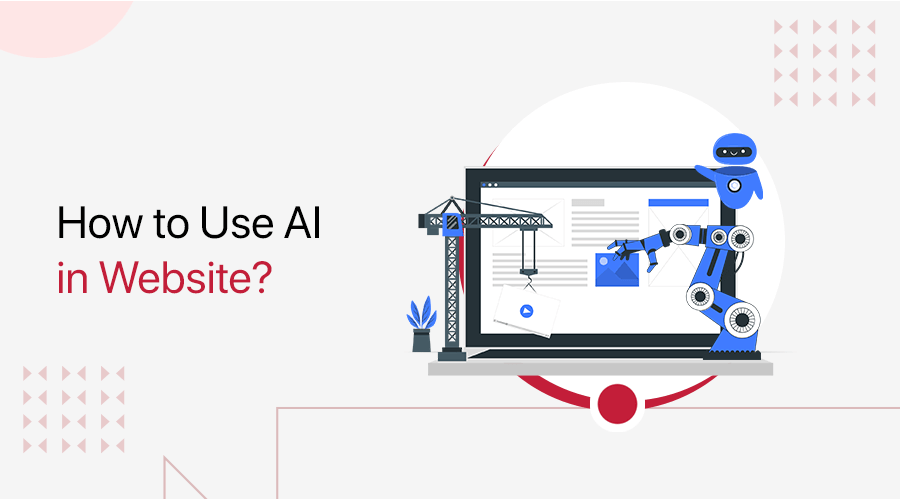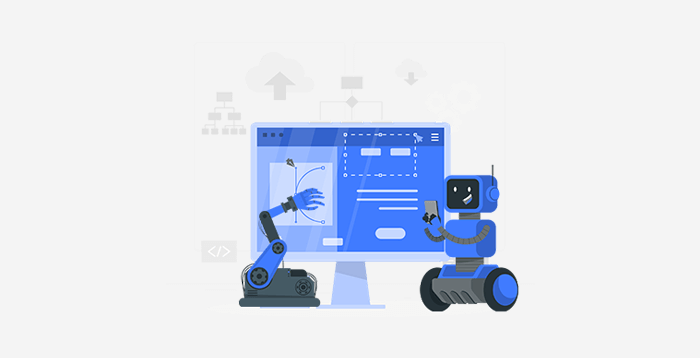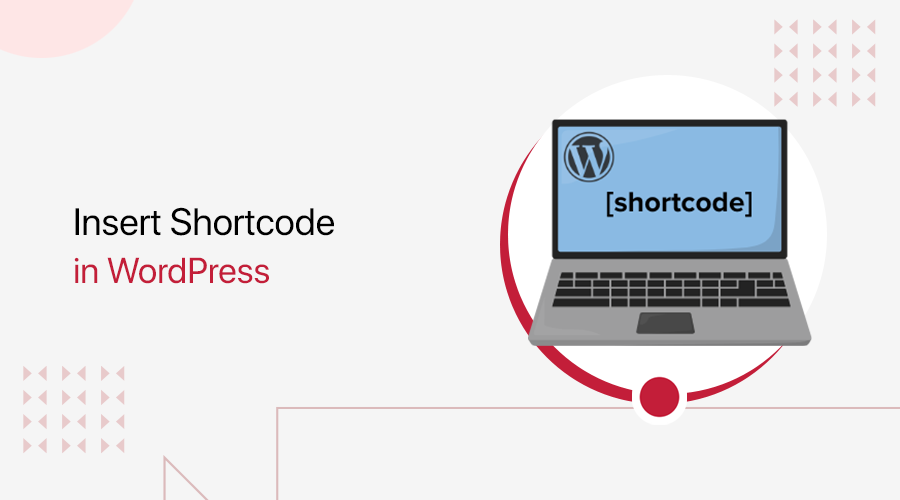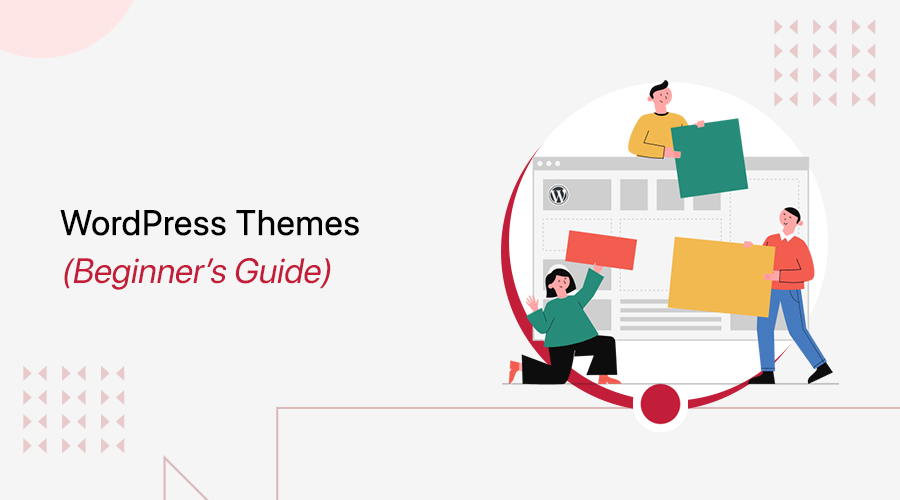
Are you looking to use Artificial Intelligence (AI) on websites? Doubting whether you should implement AI on your website or not? Then don’t worry, you’re in the right place.
In today’s digital world, the effective utilization of AI is a must. Growing individuals or businesses must use AI to enhance their online presence and stay ahead of the competition.
Website building is one area where AI has shown significant future possibilities. It has provided numerous opportunities to enhance user experiences, streamline operations, and drive business growth.
In this article, we’ll explore the numerous applications of AI that can be implemented on websites. We’ll explore the key aspects of AI integration, from security to chatbots, to help you in your website development journey.
Let’s begin.
A. Understanding AI in Website Development
Artificial intelligence (AI) is the process of recreating human thinking in machines and teaching them to reason and acquire knowledge similarly to humans. It makes use of a variety of techniques and technologies, including computer vision, natural language processing, and machine learning.

In website development, AI is crucial for improving user experiences and optimizing various website features. Based on user behavior, preferences, and demographics, it enables you to personalize content and recommendations.
Also, AI-powered chatbots and virtual assistants make people more interested and provide fast, helpful customer service.
Nevertheless, AI helps analyze large amounts of data to derive valuable insights about website performance, user behavior, and market trends. Developers then use that data to make data-driven decisions to enhance the functioning and appearance of websites.
AI helps automate repetitive processes like data entry, image tagging, and content creation. As a result, it helps developers work more effectively and save time. Additionally, it can help with website testing, problem detection, and security enhancement.
Overall, AI makes websites better by customizing, automating tasks, working faster, and keeping things safe.
Benefits of Using AI in Website Development
There are various advantages to using AI in website development that increase user experience and overall efficiency. Some of the main advantages are as follows:
- Personalization – To deliver personalized content, recommendations, and experiences, AI systems can analyze user data, behavior, and preferences. User engagement, customer satisfaction, and conversion rates are all improved by this level of personalization.
- Improved User Experience – Virtual assistants and chatbots driven by AI offer quick and personalized customer service. It helps customers with their queries and improves the website’s overall user experience.
- Automation – Automating repetitive tasks like content creation, data entry, and testing is possible with AI. Thus, it enables website developers to concentrate more on complex and creative areas of website building.
- Enhanced Security – AI can identify and prevent security concerns like fraud, spam, and malware attacks. Additionally, it can keep an eye out for suspicious user activity and take preventative security measures.
- Improved SEO – To improve website content and increase organic traffic, AI can examine keywords, user intent, and search trends.
- Natural Language Processing (NLP) – NLP makes voice search possible and enhances user interactions, improving website usability.
All things considered, integrating AI in website development offers automation and data-driven decision-making, which boost consumer satisfaction and drive business growth.
B. How is AI Used for Website Improvements?
AI is changing how we create, optimize, and personalize websites for better user experiences. Let’s learn about the positive impact of AI on website development.
i. AI-powered Design Tools
AI-powered design tools have streamlined and improved the design process. This has fundamentally changed how we develop websites. These tools use AI algorithms to automate web design tasks, making work faster and improving user experiences.
With the help of AI tools, you may automatically create optimal layouts based on content analysis.
But it gets rid of the need for humans to do coding and makes the development process much better. Consequently, this enables designers to concentrate more on the creative aspect of web design.

Similarly, AI design tools give helpful suggestions and feedback as you create your design. For instance, tools like Canva analyze user preferences. They then suggest color schemes, font combinations, and image selections.
Meanwhile, they help with content production and optimization. Technologies like Jasper and Copy.ai generate high-quality content for websites. They use AI algorithms that are SEO-friendly.
Additionally, they provide suggestions to improve the content’s readability, tone, and overall structure. These enhancements can make the content even better.
Likewise, AI design tools let you quickly prototype and test website ideas. They let designers simulate user interactions and quickly produce interactive prototypes.
Overall, AI-powered design tools dramatically streamline and speed up the development of websites. It automates many design tasks and offers intelligent suggestions. It also helps with rapid prototyping and assists in content creation.
ii. Intelligent Search Functionality
Intelligent search functionality powered by AI is essential to the development of websites. It improves the user experience by enhancing conversion rates and search accuracy.
This technology utilizes AI algorithms to comprehend user intent and analyze content. It then delivers search results that are relevant to the user. AI allows websites to provide precise and customized search results. This simplifies the process of visitors finding what they need.
Moreover, search functionality enhances website development as it can understand natural language queries. This makes it easier for users to find what they’re looking for.
Intelligent search engines have the capability to grasp the intention behind user queries. They go beyond mere keyword matching to provide more accurate results. This delivers more precise and relevant results.
For example, an online shopping website equipped with search functionality can understand queries like “men’s blue denim jacket”. Then, it’ll display matching products, increasing the likelihood of a purchase.

Additionally, AI-driven search can generate insightful suggestions based on user preferences and behavior. By examining user behaviors such as click-through rates and browsing history, the search engine can suggest relevant products or content. It uses this data to enhance user experiences.
The possibility of AI-driven search to get better over time through machine learning is another benefit. Search results get more precise due to the iterative learning process since the AI algorithm adjusts to user preferences.
In summary, the development of websites is being revolutionized by AI-driven intelligent search capabilities. Websites can improve conversions and promote business success by understanding natural language searches and providing intelligent recommendations.
iii. Personalized Content and or Product Recommendations
In the development of websites, AI is essential for providing personalized content and product recommendations. AI systems can examine individual preferences and behavior patterns to deliver personalized experiences using machine learning algorithms and user data.
AI algorithms collect and analyze various user data, including browser history, purchase history, and social media activity. In the end, those data serve as the basis for personalized recommendations. This enables the system to gain a deeper understanding of each user.
Additionally, it segments available content into various categories to help in organizing and providing users with relevant options.
Similarly, AI systems use advanced recommendation techniques like collaborative filtering and content-based filtering. To create personalized recommendations, such techniques help find patterns and similarities across users and products.
To make product recommendations based on a user’s browsing and purchasing history, the majority of eCommerce websites nowadays use AI. Hence, if a user repeatedly searches for gaming laptops, then the AI system can suggest equivalent products or related items like gaming keyboards and accessories.
Whereas a news website can recruit AI to provide personalized article recommendations based on a user’s reading preferences and interests.
iv. Performance Optimization
To optimize website performance, AI is a significant factor. It offers advanced tools and techniques for enhancing website performance, content quality, user satisfaction, and search engine visibility.
Optimizing website speed is one of the primary areas where AI may contribute. Various website components are analyzed and optimized using AI algorithms. Such as speeding up load times and overall performance using things like images and caching.
NLP (Natural Language Processing) techniques are used by AI to assist with content optimization. The context and relevance of the website’s content are analyzed and understood by the algorithm. This helps developers produce content that is both user- and search engine-friendly and keyword-rich.

AI algorithms can study search engine algorithms and offer guidance on how to optimize the structure of websites to increase organic visibility. Additionally, AI-powered SEO tools support competitor analysis and produce data-driven recommendations for improving search engine rankings.
In conclusion, AI provides website designers with intelligent tools and techniques for SEO and performance improvement. AI assists in the development of quicker, more user-friendly websites with optimal content by automating processes and offering useful insights.
v. AI-Driven Chatbots for Customer Support
The performance and user experience of the website are considerably improved by chatbots powered by AI. Since it offers visitors and customers quick, customized assistance and support.
Here are a few examples of the improvements that these chatbots can make:
- AI chatbots can instantly respond to customer inquiries, 24/7.
- With the help of chatbots, customers can be guided through a variety of processes and have their problems resolved in real time.
- They can handle multiple conversations simultaneously, eliminating the need for customers to wait in long queues.
- Response times are greatly reduced, which improves customer retention and satisfaction.
- Additionally, it can use customer information and purchasing history to provide customized suggestions and recommendations.
- Chatbots can collect insightful customer data and apply it to better website layout, enhanced product selection, and improved marketing strategies.
- Also, it can learn from each customer interaction, constantly improving its responses and accuracy.
In conclusion, AI-powered chatbots offer instant assistance, improve response times, and continue to improve thanks to machine learning. Together, these features improve the website’s functionality, user experience, and overall business performance.
vi. Dynamic Content Generation
AI helps with dynamic content curation for websites. The process of gathering, filtering, and presenting users with relevant and interesting content is typically automated. Here’s how AI is used in dynamic content curation:
- Data Collection – AI algorithms can search the internet to collect vast amounts of data related to a specific topic.
- Content Filtering – Using NLP techniques, they analyze and understand the content’s context, sentiment, and relevance. It filters out irrelevant content and ensures that only high-quality content is presented to website visitors.
- User Personalization – AI studies and analyzes user data to deliver personalized content recommendations. This helps create a tailored experience for each user, increasing engagement and satisfaction.
- Topic Clustering – Helps cluster similar pieces of content based on their themes or topics. This makes it easier to organize and categorize the curated content. Hence, it makes it easier for users to navigate and find relevant information.
- Content Ranking – AI algorithms analyze metrics like click-through rates, time spent on a page, and social media shares. This determines the most valuable and engaging content to be displayed prominently.
Websites can offer customers a personalized and engaging experience via AI for dynamic content curation. The ability of AI to gather, filter, and deliver relevant content in real time enhances the website’s overall functionality.
vii. AI-powered A/B Testing
The development of websites has greatly benefited from AI-powered A/B testing. It enhances the user experience and allows for data-driven decision-making. A/B testing involves comparing two versions of a webpage to determine which one performs better.
Large amounts of user data can be analyzed by AI algorithms, which can then automatically produce insights and recommendations. Website developers can run A/B testing more successfully and efficiently with AI.
Besides, AI systems can identify patterns and behaviors humans might miss, producing more accurate outcomes.
Additionally, it helps in the optimization of various website development components, including layout, design, content, call-to-action buttons, and more. It enables developers to test multiple versions at once and make changes to enhance the user experience and achieve specific goals.
In the end, AI-powered A/B testing saves time and resources by removing assumptions and delivering insightful data. Consequently, this will increase engagement, conversions, and overall effectiveness of website development efforts.
viii. AI-based Threat Detection and Prevention Mechanism
Website security is improved and malicious activity is protected via AI-based threat detection and prevention mechanisms. These systems evaluate user activity, identify patterns, and quickly identify potential dangers using AI approaches.
Here are a few instances of how AI is applied to improve website security and detect threats:
- Unusual Behavior Detection – The AI algorithm detects unusual behavior by analyzing browsing patterns and login histories. It raises an alarm and prompts further inquiry if anomalies like multiple failed login attempts occur. This protects against potential threats like account takeover.
- Malware Detection – A sophisticated security feature scans website files and code using AI to find known malware signatures or detect alarming patterns. Websites can now identify and block malicious files that might jeopardize user data using machine learning algorithms.
- Bot Detection – Websites today use AI to differentiate between real humans and automated bots. To stop actions like content scraping and Distributed Denial-of-Service (DDoS) attacks, it recognizes the bots and stops them.
- Phishing and Fraud Prevention – Website owners use AI algorithms to prevent phishing and fraud. By analyzing website content and user interactions, AI detects suspicious links and harmful attachments, protecting customers by alerting them to potential scams.
These AI-based threat detection and prevention techniques greatly improve website security. Thus, it helps in the early detection and mitigation of possible threats, eventually protecting user data and ensuring a safer online experience.
ix. Automated Email Marketing Campaigns
AI plays a significant role in enhancing email marketing campaigns for websites. It improves the process in many ways and increases its efficiency.
AI mainly makes enhanced data segmentation and analysis possible. It can find patterns and segment the audience by examining user behavior and past interactions. This makes it possible for marketers to send personalized and targeted emails, increasing engagement and conversion rates.

Similar to this, AI helps with email content and time optimization. AI algorithms can choose the most effective subject lines and call-to-action (CTA) locations by examining historical data and user responses. By doing this, open rates and click-through rates are increased.
To increase the likelihood of engagement, AI modifies the timing of email delivery based on the preferences of individual users.
Additionally, several parts of email marketing campaigns can be automated using AI-powered solutions. They can automate the generation of dynamic content as well as the creation and scheduling of emails. This ensures regular and timely communication with the audience while saving marketers time and resources.
Overall, AI provides email marketers with tools for data-driven insights, individualized targeting, content optimization, and automation. As a result, it helps websites run more productive and profitable email marketing campaigns.
C. Challenges and Considerations
Challenges and considerations regarding using AI in website development include:
1. AI vs Human Bond
The challenges and considerations in the AI-human relation in website development include striking a balance between automation and creativity. In fact, it also includes adding a human touch, encouraging collaboration, and taking ethical issues into account.
Human designers contribute to innovation but suffer from scalability. Meanwhile, AI can automate activities but needs help with design intricacy and empathy.
Websites should offer personalized interactions, as AI can’t understand emotions. Collaboration enables humans to concentrate on creativity and the user experience, while AI automates repetitive tasks and provides data insights. Artificial intelligence should be used fairly and transparently.
Hence, the development of effective, user-centric, and ethical websites depends on finding the correct balance between AI and human interaction.
2. Data Privacy and Security Concerns
Protecting user data from unauthorized access and creating transparent privacy policies are some of the security difficulties faced when developing websites.
AI and other emerging technologies require careful data management for training, maintenance, and confidentiality. Strong security measures, coordination with third-party services, user consent, and compliance with privacy laws are necessary to address these issues.
Effective user data protection requires keeping up with new risks and best practices.
3. Overcoming Technical Barriers
It’s necessary to ensure data quality, choose appropriate AI models, and use technical skills to get over technical obstacles in AI-based website development.
For accurate projections, high-quality, relevant data is required, requiring preprocessing and normalization. It’s critical to select the appropriate AI models for specific tasks.
Effective AI implementation and integration require technical expertise for model training and algorithm optimization. Sufficient infrastructure and processing resources are important factors in scalability and performance.
Continuous observation and maintenance guarantee accuracy and adaptability. Website designers can use AI to automate processes, improve user experiences, and boost overall performance by overcoming these obstacles.
4. Cost and Resource Management
Cost and resource management issues arise when using AI to develop websites. Infrastructure, computing resources, and specialist tools all need initial investments. Arranging all these can be difficult for smaller businesses.
For training, AI models need a lot of data, which drives up storage and processing expenses. Effective administration of huge datasets becomes essential, particularly if the data needs to be updated often.
Due to the high expense of hiring AI specialists, businesses may want to teach their current employees instead. AI models require regular maintenance and updates, which calls for dedicated resources for performance improvement, monitoring, and bug fixing.
Careful budgeting, data processing and storage optimization, and long-term maintenance planning are all essential components of effective management.
D. Future Trends – Advancements of AI in Website Development
Future advances in website development in AI are expected to deliver exciting innovations and advancements. These are some important trends to remember:
- AI-driven virtual assistants and chatbots will advance, offering real-time assistance and personalized recommendations.
- Websites will integrate voice search functionality and voice-enabled navigation to enhance user convenience.
- By analyzing data, finding out user preferences, and generating customized and targeted content, AI will help in content creation.
- Better decision-making and website performance optimization will be made possible by a more sophisticated data-driven approach.
- AI will assist designers with developing websites that are both aesthetically pleasing and user-friendly. It’ll make design suggestions, automate lengthy design processes, and guarantee consistent branding across all web pages.
- Advanced AI algorithms will continuously evaluate website traffic, find anomalies, and prevent fraudulent actions to improve website security.
Overall, AI primarily focuses on enhancing user experiences and personalization. It also helps in content creation, data analysis, and design assistance. By following these trends, websites can make future experiences more interesting and useful for users. It’s all about enhancing user satisfaction and interaction.
Conclusion
In this article, we looked at how to use AI on websites. We hope this article provides an idea of how you can work with AI for web development.
In conclusion, AI in website development holds great potential for enhancing user experiences. It also plays a crucial role in promoting business success.
Data quality, technical expertise, ethical considerations, and cost management must be carefully taken into account. One can use AI to make significant advancements by overcoming these obstacles and embracing the chances.
Please feel free to comment below if you’ve any further queries about the use of AI on websites. We’ll do our best to respond as soon as we can.
Also, let us know which AI technology or strategy you’re going to use from the list. You can share your top pick in the comments section below.
Besides that, we’d also love to hear your thoughts on this article. So, please feel free to comment on any queries or suggestions below.
You may also want to check out our articles on the best AI WordPress themes and the best AI SEO software tools.
Follow us on Facebook and Twitter for more articles like these. Also, if you liked this article, then share it with your friends and colleagues.


